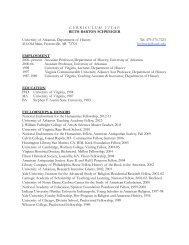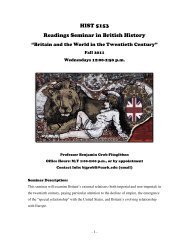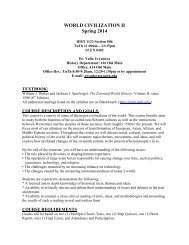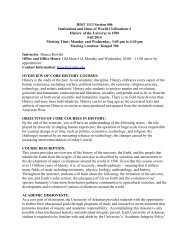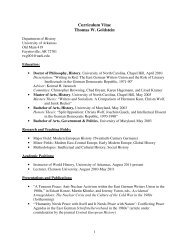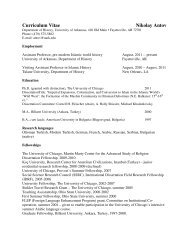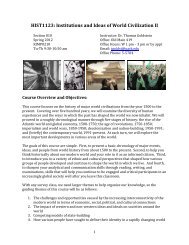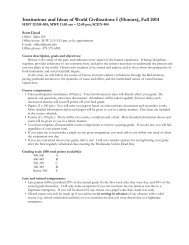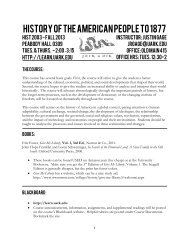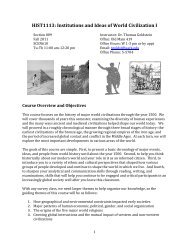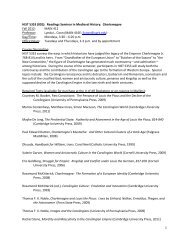HIST 1123.026: World History II, c.1500-present - University of ...
HIST 1123.026: World History II, c.1500-present - University of ...
HIST 1123.026: World History II, c.1500-present - University of ...
Create successful ePaper yourself
Turn your PDF publications into a flip-book with our unique Google optimized e-Paper software.
<strong>HIST</strong> <strong>1123.026</strong>: <strong>World</strong> <strong>History</strong> <strong>II</strong>, <strong>c.1500</strong>-<strong>present</strong><strong>University</strong> <strong>of</strong> Arkansas, Summer <strong>II</strong> 2012M-F, 2:10-3:40pmMain 203Instructor: Jason McCollomOffice: Old Main 414Office Hours: Monday, Tuesday, 9-10:30am; Wednesday, 12:30-1:30pmEmail: jmccollo@uark.eduOverview <strong>of</strong> Core Courses in <strong>History</strong><strong>History</strong> is the study <strong>of</strong> the past. As an academic discipline, history embracesevery aspect <strong>of</strong> the human experience, including warfare, political institutions, theeconomy, religious practice, technology, and artistic endeavor. <strong>History</strong> asks studentsto analyze empire and revolution, genocide and humanism, enslavement andliberation, sexuality and gender and to do so from the perspective <strong>of</strong> both socialscientific and humanistic inquiry. There is no field more diverse than history andnone more individualistic. <strong>History</strong> can be as long ago as the excavated texts andartifacts <strong>of</strong> ancient China or as recent as mass‐produced newspapers from thetwentieth‐century American West.Objectives <strong>of</strong> Core Courses in <strong>History</strong>By the end <strong>of</strong> the semester, you will have an understanding <strong>of</strong> the following issues:-The role played by diversity in shaping human experience.-The operation <strong>of</strong> large-scale forces responsible for causing change over time, such aspolitics, economics, technology, and religion-The challenges mounted by an increasing reliance on technology-The changes caused by the increasing interconnectedness <strong>of</strong> today’s worldIntroduction and Scope <strong>of</strong> the CourseThe study <strong>of</strong> history <strong>of</strong>fers students the ability to develop important intellectual skills.<strong>History</strong> students will gain a political and cultural awareness that leads to a deeperappreciation <strong>of</strong> news, literature, art, and music. Further, the study <strong>of</strong> history will helpstudents understand the complex multicultural environment <strong>of</strong> the nation and the world.
Required Texts1. Frank McDonough, The Origins <strong>of</strong> the First and Second <strong>World</strong> Wars2. Gregory Harms, The Palestine-Israel Conflict3. Trevor R. Getz and Liz Clarke, Abina and the Important Men4. All other reading material will be placed on BlackBoard.GradingClass Participation…………………………………………………………....60pts.Multiple Choice Lecture and Readings Exams (3@ 80, 100, and 120 pts.).....300pts.Short Paper: Abina……………………………………………………….…...80pts.Short Paper: The Palestine-Israel Conflict…………………………………..100pts.Presentation: The Origins <strong>of</strong> the First and Second <strong>World</strong> War……………...100pts.Total……………………………………………………………………..…...640pts.A: 576+ pts.B: 512-575 pts.C: 448-511 pts.D: 384-447 pts.F:
Classroom Conduct and Academic Honesty (Very Important)Students are expected to be civil and respectful during class. Arriving late or leaving early aredistracting; please be on time and do not leave before the end <strong>of</strong> class unless you notify me inadvance. Do not talk during class, sleep, or use cell phones. You may use a laptop for takingnotes as long as you do not distract your peers by using the internet or playing games. I tend toroam the room when I lecture, so even if you are seated in the back <strong>of</strong> the room, I can makecertain these guidelines are followed.Plagiarism and cheating on paper assignments, quizzes, or exams are serious <strong>of</strong>fenses andwill be treated as such. Cases <strong>of</strong> academic dishonesty will be reported to the All-<strong>University</strong> Academic Integrity Board, no exceptions. In certain circumstances,students can be expelled from the <strong>University</strong> <strong>of</strong> Arkansas for violations <strong>of</strong> academichonesty.From the Provost:“As a core part <strong>of</strong> its mission, the <strong>University</strong> <strong>of</strong> Arkansas provides students with theopportunity to further their educational goals through programs <strong>of</strong> study and research inan environment that promotes freedom <strong>of</strong> inquiry and academic responsibility.Accomplishing this mission is only possible when intellectual honesty and individualintegrity prevail.“Each <strong>University</strong> <strong>of</strong> Arkansas student is required to be familiar with and abide by the<strong>University</strong>’s ‘Academic Integrity Policy’ which may be found at http://provost.uark.edu/Students with questions about how these policies apply to a particular course or assignmentshould immediately contact their instructor.”Extra CreditThere is no extra credit in this course.Office Hours and Contacting the InstructorI am happy to correspond with students via email or in person. If corresponding throughemail, please be pr<strong>of</strong>essional. Be sure to include your name and write in a pr<strong>of</strong>essionalmanner, not text-message style. Unpr<strong>of</strong>essional emails will likely not receive a response.Students are always welcome to talk with me during my <strong>of</strong>fice hours. I will be happy to giveadvice or assist students in preparation for assignments. Please do not ask me for lecturenotes. Students are responsible for taking notes or obtaining their peers’ notes if necessary.If a student cannot meet during my <strong>of</strong>fice hours, they can email me and we will set up analternate time to meet. If any issues arise or a student needs to notify me <strong>of</strong> an impendingabsence, please contact me ASAP. For example, it will not do any good to contact me theday <strong>of</strong> the final exam to discuss your failing course grade.
Late PolicyLateness is sometimes an unforeseen incident and is understandable. Please do not make ahabit <strong>of</strong> it, as it disrupts both the instructor and other students. If a student knows that therewill be a continual problem with lateness, they should consult the instructor immediately.DisabilitiesStudents with learning and/or physical disabilities who need special accommodations shouldcontact the Center for Educational Access. The Center will then inform me <strong>of</strong> your needs.WeatherThe university weather policy is available online via the university website. If the universitybuses are running, class will meet. If the instructor cannot make it to class, an email will besent out.
The following class schedule is tentative. The instructor reserves the right to alter the schedule at hisdiscretion.Week One9 JulyA. Introduction to the course and syllabus discussion.B. Introduction: “Considering <strong>World</strong> <strong>History</strong>.”C. Begin “The <strong>World</strong>s <strong>of</strong> the Fifteenth Century” lecture.D. For Tuesday: read the Provost’s Academic Integrity Policy at http://provost.uark.edu/,and the “Plagiarism” document posted on BlackBoard. Be prepared for an open-note quiz(part <strong>of</strong> participation grade) on both.10 JulyA. Quiz on the Provost’s Academic Integrity Policy and Plagiarism reading.B. Finish “The <strong>World</strong>s <strong>of</strong> the 15 th Century” lecture.C. Begin “Oceanic Explorations” lecture.11 JulyA. Con’t “Oceanic Explorations”B. Begin “Making <strong>of</strong> the Atlantic <strong>World</strong>” lecture12 JulyA. Discussion (part <strong>of</strong> participation grade): “Why Europe?” Read material onBlackBoard: Nicholas Krist<strong>of</strong>, “1492: The Prequel”B. Con’t “Making <strong>of</strong> the Atlantic <strong>World</strong>”13 JulyA. Finish “Making <strong>of</strong> the Atlantic <strong>World</strong>”
Week Two16 JulyA. “Pacific Empires and Landed Empires: Russia, China, Mughals, Ottomans” lecture.17 JulyA. Con’t “Pacific Empires and Landed Empires”B. Begin “Atlantic Slave Trade”C. Discussion (part <strong>of</strong> participation grade): Read article on BlackBoard: Maynes andWaltner, “Women and Marriage in Europe and China”18 JulyA. Con’t “Atlantic Slave Trade”B. Review for Exam #119 JulyA. Exam #1B. Finish “Atlantic Slave Trade”20 JulyA. “Religion and Science: Renaissance, Reformation, the New Science and theEnlightenment”
23 JulyA. “Atlantic Revolutions” lecture.Week Three24 JulyA. Con’t “Atlantic Revolutions” lecture.B. Discussion (part <strong>of</strong> participation grade): Read on BlackBoard, Chakrabarty,“Compassion and the Enlightenment”25 JulyA. “The Industrial Revolution”26 JulyA. “The New Imperialism”B. Review for Exam #227 JulyA. Con’t “The New Imperialism”B. Exam #2Week Four30 JulyA. “China, Japan and the Ottoman Empire, 1800-1914”31 JulyA. Con’t “China, Japan and the Ottoman Empire, 1800-1914”B. Abina paper due. Discuss Abina (part <strong>of</strong> participation grade)1 Aug.A. Con’t “China, Japan and the Ottoman Empire, 1800-1914”B. Begin <strong>present</strong>ations on The Origins <strong>of</strong> the First and Second <strong>World</strong> Wars2 Aug.A. Con’t <strong>present</strong>ations.3 Aug.A. Begin “Comparing Communism: The USSR and China”
6 Aug.B. Con’t “Comparing Communism”Week Five7 Aug.A. Begin “The End <strong>of</strong> Imperialism and Decolonization”8 Aug.A. Con’t “The End <strong>of</strong> Imperialism and Decolonization”B. Review for Exam #39 Aug.A. Exam #310 Aug.A. Israel-Palestine Paper DueB. Discuss Israel-Palestine book (part <strong>of</strong> participation grade)



